Broadbanding
- In broadbanding, the job grades verses spot salary is used in making the decision.
- Broadbanding is critical in managing human resources since it accounts for the value of every unit of labor given in line with job group.
- Implementation of broadbanding is very easy and economical.
- In broadbanding, it is easier to identify exemplary performance from employees.
- Broadbanding has created a very flexible means of managing the labor force.
- Broadbanding is associated with limited internal pay relatively, especially due to the fact that the system has little control in the progression of salaries.
- Broadbanding is not suitable for properly structured organizations with clear hierarchical order and defined roles for the different groups of employees.
- Broadbanding suits organizations that are flat (flexible and tolerant to lateral movement.
- Highly structured organizations should adopt the traditional multi-grade structure in salary verses role determination.
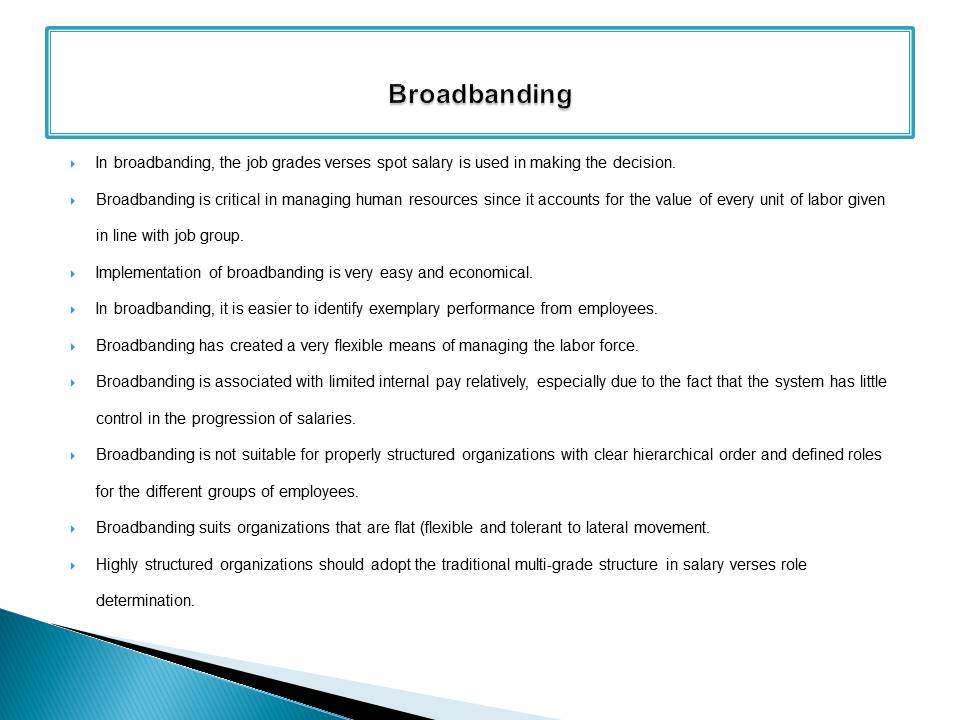
Factors to Consider When Applying Broadbanding
- Pay satisfaction is a central element of employee attraction and retention.
- Pay adequacy and equity are the determinants of pay satisfaction.
- Equity theory requires employees to be evaluated through comparison of the ratio of their inputs and outputs with the ratio of input and output of other employees.
- The inputs take different forms. For instance, what the job contributes, the extra role behavior exhibited by the employee and personal contributions.
How to distribute the pay rise
- In most cases, the management distributes annual pay rise uniformly to all employees. In such cases, it is computed as a percentage increase of current salaries of the employees.
- However, the hard working employees might feel unmotivated since non hard working employees also receive the same share.
- As an alternative, management often distributes the pay rise based on the performance of the employees. This ensures equitable distribution of the pay rise. There are steps that the manager needs to follow to achieve this equitable distribution.
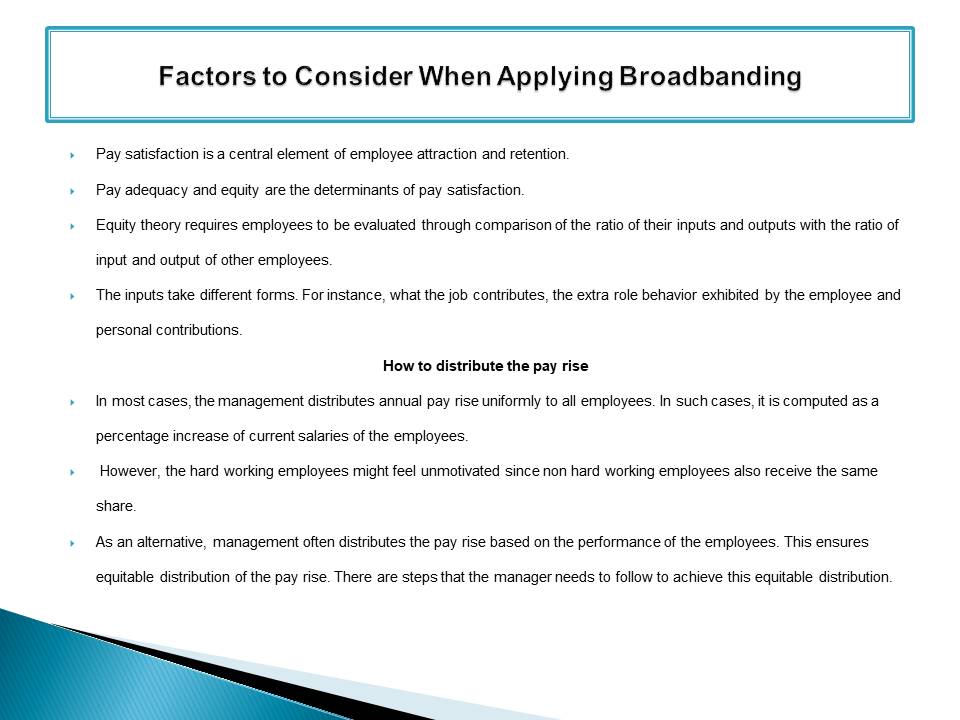
What Will Make Broadbanding a Success
- Training and development form part of organizational strategy mostly because organizations are characterized by numerous expansions without and within the region. Consequently, there is a need to merge organizational skills, knowledge, and culture with the new challenges and demands of broadbanding (Heathfield 2011).
- Organizations need to use broadbanding largely because they operate in a highly competitive sector. Broadbanding ensures that the company remains ahead of the competition.
- Management ought to realize that there is no better way to achieve this rather than through the use of broadbanding, training, and development.
- Further, the management should evaluate the effectiveness of broadbanding in realizing the goals and objectives of the company. Finally, the management of the company should use the outcomes of broadbanding system in decision making that relate promotions and transfers within the organization.
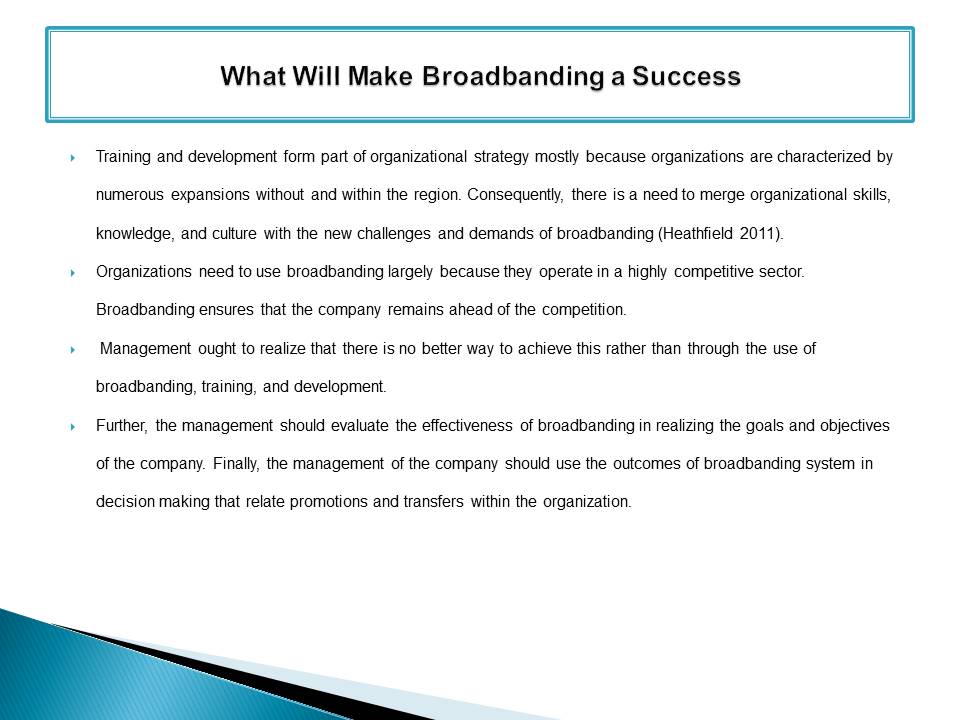
The Scope of Broadbanding
- Broadbanding involves jobs grouping depending on responsibilities, duties and accountability level.
- Broadband can be aligned to the stature of an organization.
- Broadbanding widens ranges of salary in the organization to ensure that there is dependable and reliable career development, flexibility, and competitiveness.
- Broadbanding is critical in classification of jobs against pay expected.
- Broadbanding ensures an up-to-date description of jobs in an organization.
- Broadband application is critical in eliminating any possible bureaucracy involved in responsibility placement.
- Classification in broadbanding is as broad as the name suggests. It classifies managers, assistants, and other workers in groups that form part of a triangular hierarchy of control.
Advantages of Broadbanding
- Broadbanding is a critical tool for updating the job descriptions in an organization in the form of systemized language that can be applied across the organization departments.
- Broadbanding eliminates bureaucracy and unnecessary barriers that exist in the responsibility placement and compensation system in the decision to decide on the payment plan at the departmental level of management.
- The process ensures competitiveness in the market. As a result, aspect is likely to contribute towards employee retention and attraction, especially those with special skills that are in constant demand.
- Broadbanding is flexible to organizational changes and can also adopt or maintain the required threshold in change management.
- Broadbanding is critical in supporting sustainable career development endeavors among employees as the departmental management may be in a position to implement career planning designs.
- Broadbanding provides a comprehensive integration mechanism for the remuneration-related policies and values of an organization.
Disadvantages of Broadbanding
- Broadbanding does not accommodate external market rates in defining salary structures of an organization. If a manager goes ahead and offer the market rates, he or she may remain at a fix since broadbanding has no midpoint. Thus, broadbanding limits the use of compa-ratio management tool.
- Broadbanding is likely to lead to series of inequalities in the labor segment of an organization. The sole trust in management and its flexibility may culminate into inequalities in salaries. For instance, it is very easy to identify a duo within the same broadbanding responsibilities but have a substantial earnings variance. Therefore, broadbanding in this view is likely to weaken the skill development against salary growth determinant in an organization.
- Broadbanding is subject to manipulation by reckless managers who might over pay a worker within the same band and neglect others doing the same responsibility. This is likely to kill the morale of the employees and lead to discrimination.
- Broadbanding lowers the opportunities that are often available for promotions in the organization. In fact, the organization must be careful not to lose its talent as employees who have stayed for long in a position may opt to exit for other organizations that have enough room for promotion.
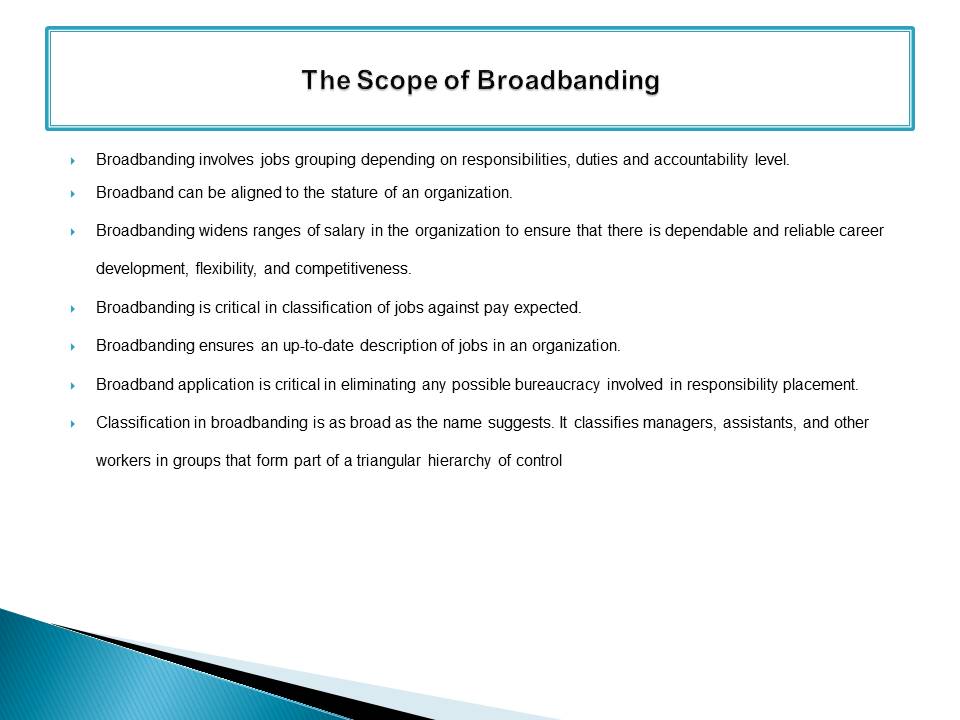
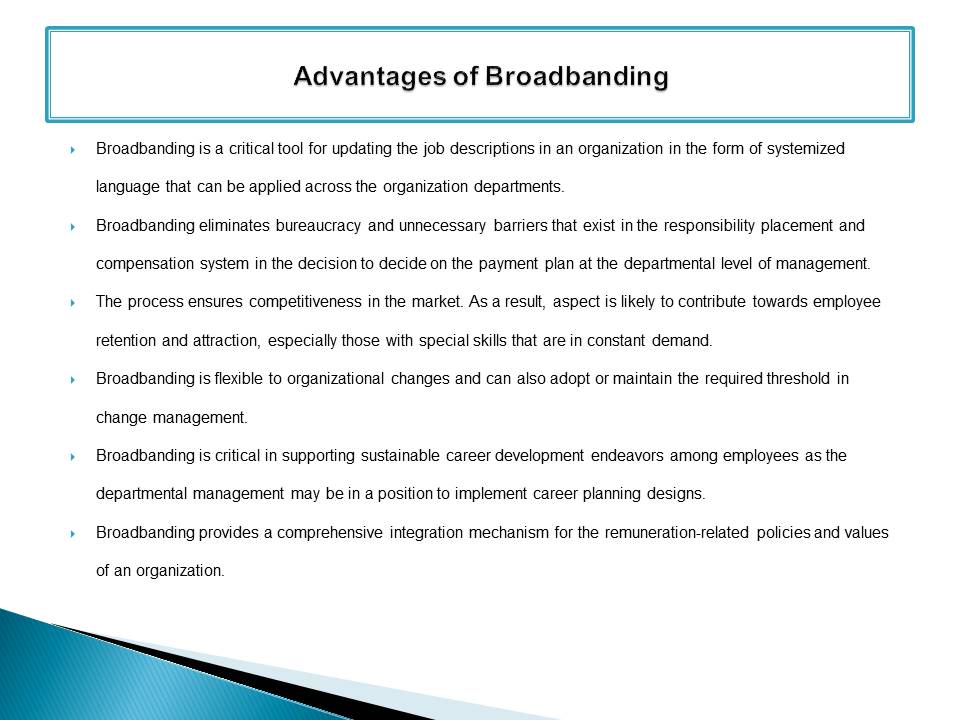
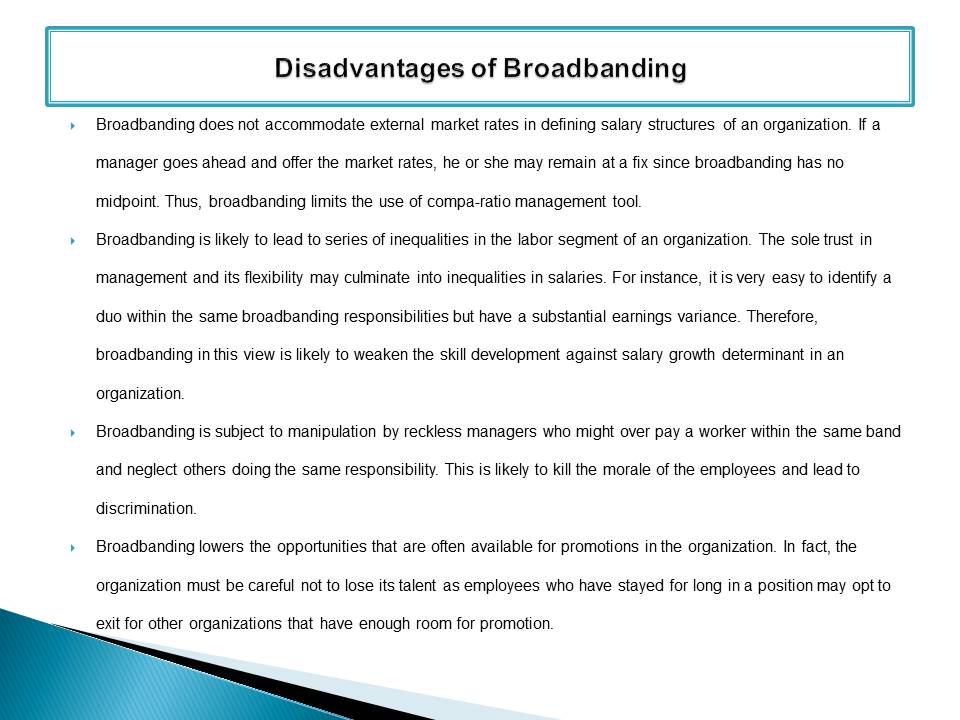
Alternative to Broadbanding
- The traditional multi-grade structure is also an important tool in grouping jobs in an organization.
- This method works best in a highly structured organization with a well organized bureaucratic system of management.
- For this method to work best, the organization must have its rules that must be followed even by the managers in remuneration decisions that must be supported by scientific explanation.
- Under the traditional multi-grade structure, the current market rates are periodically reported to management to align the salaries to the prevailing market rates.
- Besides, it has very many and distinct job classifications with different salary options.
- However, the system does not respond so well to market swings and organization change programs that are designed to cut costs.
- In traditional systems, promotion automatically results in progression of pay in line with the new position.
- In addition, this system is fair to employees since it controls the discrepancies between salaries paid to different staff depending on their job description, roles, and responsibilities that are often harmonized.
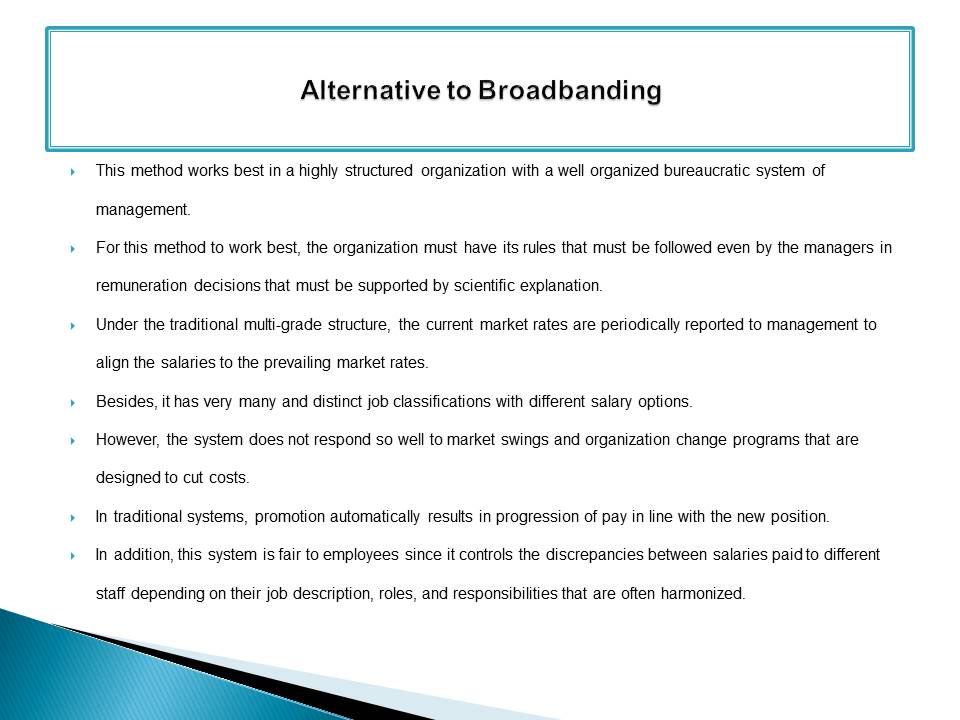
Recommendation
- Efficiency and strategic implementation of broadbanding creates value for the organization. Efficiency stage aims at designing the system.
- It views a human resource system as a means to higher productivity and efficiency.
- In addition, the phase views labor environmental management as a foundation of preventable costs for the organization.
- The phase emphasizes on reporting, risk avoidance, systematic human resource management, improved efficiency, and engagements (Hallman 2000).
- A company should endeavor to mitigate risks surrounding its business so as to have a favorable report that meets the requirement of Triple Bottom Line reporting framework.
- A suitable approach is the balance between broadbanding and the traditional system. The balance should be well structured and aimed creating a motivational work environment.
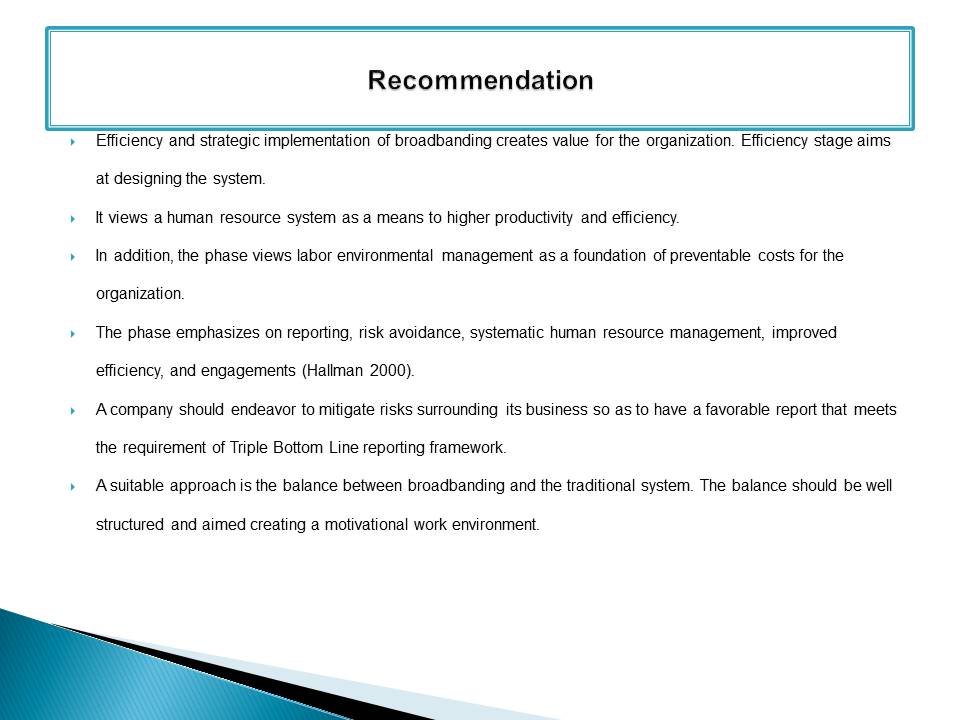
Conclusion
- HR management deals with management of labor in an organization.
- Operations function is central to any business because it deals with merchandise.
- As a whole, operations management contributes to the organizational strategy through employee satisfaction, reduction of risks resulting from operational failures, reduction of the amount of investment, and providing a basis for future innovation among staff members.
- Employees are useful determinants of success of an organization. They need to be adequately motivated to ensure execution dates in the organization’s strategic plan.
- Broadbanding is necessary in achieving this since it provides for flexibility and has defined responsibilities and roles for each job group description. Broadbanding functions best in flat organizations with little or no comprehensive hierarchical order of management.
- However, the organization may also opt for the traditional system since it gives room for promotion and salary increments that are the main factors that determine employee ‘retainability’.
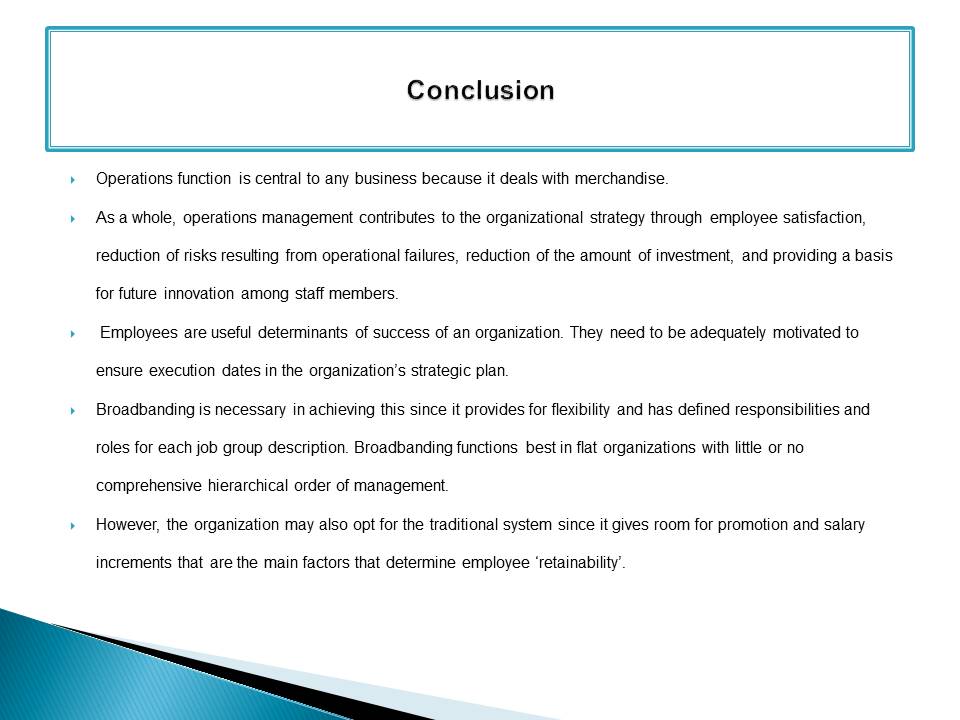
References
Hallman, G. (2000). Broadbanding. Web.
Heathfield, S. (2011). Human Resources: Broadbanding. Web.